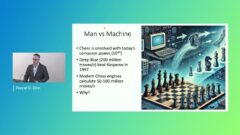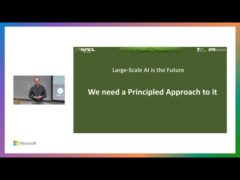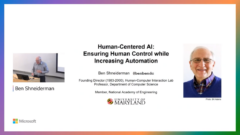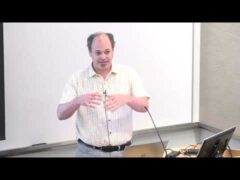Towards Optimal Algorithms For Prediction With Expert Advice
- Balu Sivan | Microsoft Research
We study the classic problem of prediction with expert advice in the adversarial setting. Focusing on settings with a constant number of experts, we develop optimal algorithms and obtain precisely optimal regret values for the case of 2 and 3 experts. Our main tool is the minimax principle which lets us analyze the optimal adversary to compute optimal regret values. While analyzing the optimal adversary, we establish connections with non-trivial aspects of random walk. We further use this connection to develop an improved regret bound for the case of 4 experts. All prior work on this problem has been restricted to optimal algorithms for special cases of adversary, or, algorithms that are optimal only in the doubly asymptotic sense: when both the number of experts and the time horizon go to infinity. In contrast to these results, our algorithms are exactly optimal for the most general adversary and obtain a constant gap separation in regret from all previously known results. (Joint work with Nick Gravin and Yuval Peres.)
Speaker Bios
Balu Sivan is a postdoc in the Theory Group at Microsoft Research Redmond. He received his PhD in Computer Science from the University of Wisconsin-Madison advised by Prof. Shuchi Chawla. His primary research interests are in Algorithmic Game Theory and online/approximation algorithms. More details here: http://research.microsoft.com/en-us/um/people/bsivan/
-
-
Jeff Running
-
-
Taille: Microsoft Research Talks
-
Decoding the Human Brain – A Neurosurgeon’s Experience
- Dr. Pascal O. Zinn
-
-
-
-
-
-
Challenges in Evolving a Successful Database Product (SQL Server) to a Cloud Service (SQL Azure)
- Hanuma Kodavalla,
- Phil Bernstein
-
Improving text prediction accuracy using neurophysiology
- Sophia Mehdizadeh
-
Tongue-Gesture Recognition in Head-Mounted Displays
- Tan Gemicioglu
-
DIABLo: a Deep Individual-Agnostic Binaural Localizer
- Shoken Kaneko
-
-
-
-
Audio-based Toxic Language Detection
- Midia Yousefi
-
-
From SqueezeNet to SqueezeBERT: Developing Efficient Deep Neural Networks
- Forrest Iandola,
- Sujeeth Bharadwaj
-
Hope Speech and Help Speech: Surfacing Positivity Amidst Hate
- Ashique Khudabukhsh
-
-
-
Towards Mainstream Brain-Computer Interfaces (BCIs)
- Brendan Allison
-
-
-
-
Learning Structured Models for Safe Robot Control
- Subramanian Ramamoorthy
-
























